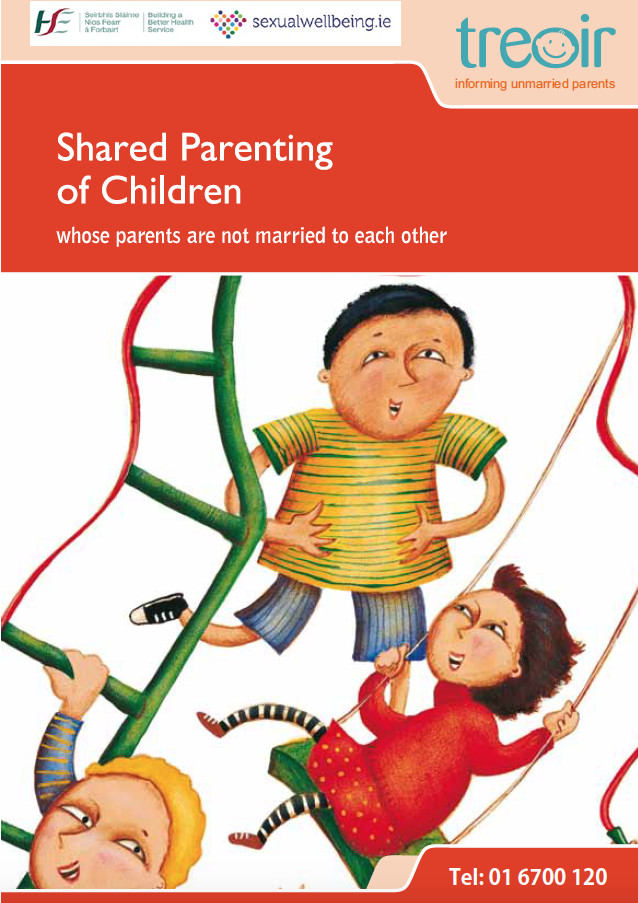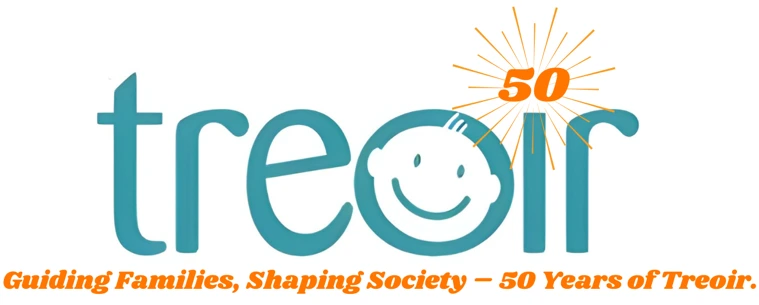Both parents are very special to their children and it is important for children that, where possible, both parents take a positive parenting role in the lives of their children and exercise their responsibilities to their children. Just because a relationship between parents is over, it does not mean that one parent disappears out of the child’s life or mind.
Children in all families benefit from the ongoing affection, interest and concern of both their parents. When parents support their child’s relationship with the other parent, they are promoting their child’s right to an independent and meaningful relationship with each parent. Research shows that children, too, recognise the importance of a continuing relationship or link with both parents, no matter how distant.
What is Shared Parenting?
Shared parenting is the process of supporting the development of children by parents who are not living together, yet parent together. It can be described as parenting by way of good communication, shared decision making, and the sharing of information about your child’s wellbeing. It is based on mutual respect where parents actively work together to create a positive environment where children feel loved, can flourish, and are cared for and supported by both parents.
The Let’s Work it Out programme is currently on hiatus and is not taking any new referrals for the time being.

Need help with shared parenting?
Let’s Work it Out – This is a new service offered through Treoir in collaboration with Dublin Community Mediation. Let’s Work it Out aims to support parents through one-to-one work in developing shared parenting skills.
Why should parents share parenting?
It is widely accepted that shared parenting is in the best interest of children, leading to improved emotional wellbeing of developing children.
- Shared parenting gives children the possibility of a nurturing relationship with both parents and their extended families.
- Children have the assurance that both parents still love them even though the parents are not living together.
- It reassures children that they have two parents, and although they live in separate places, the children have a home with each of them.
- One parent is not unfairly burdened with the responsibility of discipline whilst the other becomes merely the fun or contact parent.
How does shared parenting work?
Successful shared parenting does not happen by chance. It takes work. It needs parents to:
- co-operate
- be patient
- listen to hear the other parent rather than react to the other parent
- communicate
- avoid conflict in front of children
- put to one side their anger or resentments
- put their children’s welfare before their own comfort
- acknowledge that their children want and need both parents
- develop a new co-operative, parenting relationship with the other parent
- develop a parenting plan, and try to be flexible as plans may need to change from time-to-time
Shared parenting can work well if it’s child-focused rather than adult-focused. The essential element is the goodwill and determination of the parents to make it work.
Make a parenting plan
A parenting plan is a way of sorting out parenting arrangements. A parenting plan sets out how to share time with the children, how to manage responsibilities, and how to make decisions about the children.
School arrangements, childcare, holidays, pocket money can all be part of a parenting plan. Times can be arranged for telephone calls, discussions around money or childrearing, strategies for dealing with differences of opinion if they arise. See further information on Birth Registration, Guardianship and Maintenance.
A parenting plan
- provides continuity and predictability for children in their relationship with each parent.
- means the children will know when they will be with each of you.
- provides a structure so everyone is clear about future living arrangements.
- helps to reduce conflict
A written plan works best. It makes for clarity and certainty while allowing parents to write into it provisions for flexibility and dealing with the unexpected.
Top Tips
- If you have difficulty reaching an agreement you may need the help of a mediator who can assist you in reaching your own agreement.
- Children need information on the arrangements. Changes or cancellations should be explained well in advance.
- Be on time for the children and plan the beginning and end time with the other parent carefully as everyone is usually on edge at these times.
- Don’t use the children’s handover time to sort out problems with the other parent.
- If you are in the initial stages of a new relationship, don’t introduce a new partner too soon. Your time with your children is limited but precious.
- Do not encourage gossip and tale telling – don’t expect children to be a spy in the other camp, bringing back secrets.
- Help the children’s other parent to feel responsible and involved as a parent. Inform each other about medical or other appointments. You could send copies of school reports and photos. Try to work out which parent goes to what school event (or even go together), as leaving it to chance can be upsetting for children. What matters most is that someone is watching, applauding, listening to their talk, meeting their friends, and sharing the day with them.
- Children need to feel at home in both homes by having their place in the family acknowledged. Having their own toothbrush, duvet, toys and books is a sign that they belong and are not merely visiting.
- Ensure that your children know they can ask questions about the other parent, or their extended family and always be positive about their other parent and family.
- Contact with other family members, such as grandparents, can also be very beneficial for children.
- If the other parent lives far away they can keep contact through phone calls, video calls, letters and emails.
- If children are having regular contact with both parents then it is worth bearing in mind that some other people need to know this, for example teachers, club leaders etc. Teachers should also know who should and should not see or collect children and also who should be told or consulted about school matters.
- Use age-appropriate language whenever your child asks about their shared parenting family, and try to talk about different family types in a positive way.
- Most importantly be positive about your shared parenting family as this will build your child’s confidence and self esteem, especially when they hear good things about themselves and those close to them.
Positive pointers for shared parenting
- Parenting is a job for life and for children there is no such thing as an ex-parent.
- Children recognise the importance of a continuing relationship or link with both parents, no matter how distant
- Remember that it is not adding people to children’s lives but taking important people away that is hard for children to accept.
- Children need to know that it is all right for them to love both parents and to like or love step-parents and new partners.
- Try to come to terms with the fact that your children may have a relationship with their other parent over which you have no control. You need to respect each other’s parenting style.
- Adults need to separate their parenting relationship with their children from the relationship (or lack of one) they have with each other.
- Don’t let your own unresolved emotions get in the way and do not involve your children in parental conflict. Make a time to discuss disagreements and not in front of the children. Try not to use condescending or derogatory language to each other At the end of the day it is important that children feel loved by both parents and can feel free to love both of you as parents.
Mediation
Mediation is where a third party helps parents reach an agreement. It encourages parents to co-operate with each other in working out the details of shared parenting.
Family Mediation Service:
Phone – 01-8747446, www.legalaidboard.ie
The Mediators’ Institute of Ireland: Phone – 01-6099190, www.themii.ie
Dublin Community Mediation:
Phone: – 01 4515910 – Mobile: – 089 9633170 https://www.dcmhelp.ie
Collaborative law – where parents work with specially trained lawyers, receive legal advice and guidance, and together with the lawyers, discuss and resolve issues through face-to-face meetings.
Association of Collaborative Practitioners:
01 2302157, info@acp.ie, www.acp.ie
Legal Aid Board: Tel: 0818 615 200, www.legalaidboard.ie
Family Links Steps and Stages
We also have a book called Family Links Steps and Stages which goes into more detail about talking to children about their other parent and about shared parenting. It has a good chapter on step-parenting. This publication can be ordered from Treoir, Call 01 6700 120, and is free of charge to individuals.
“Well done to Treoir for providing this excellent guidance to those who are attempting to co-parent and who may be finding it difficult” – service provider, December 2013
Treoir
Federation of services for unmarried parents and their children
Tel: 01 670 0120, info@treoir.ie | www.treoir.ie
The Legal Aid Board
Locall: 0818 615 200, Tel: 066 947 1000, info@legalaidboard.ie | www.legalaidboard.ie
Free Legal Advice Centres
Tel: 01 9061010 | www.flac.ie
Shared Parenting for Children – Whose parents are not married to each other

